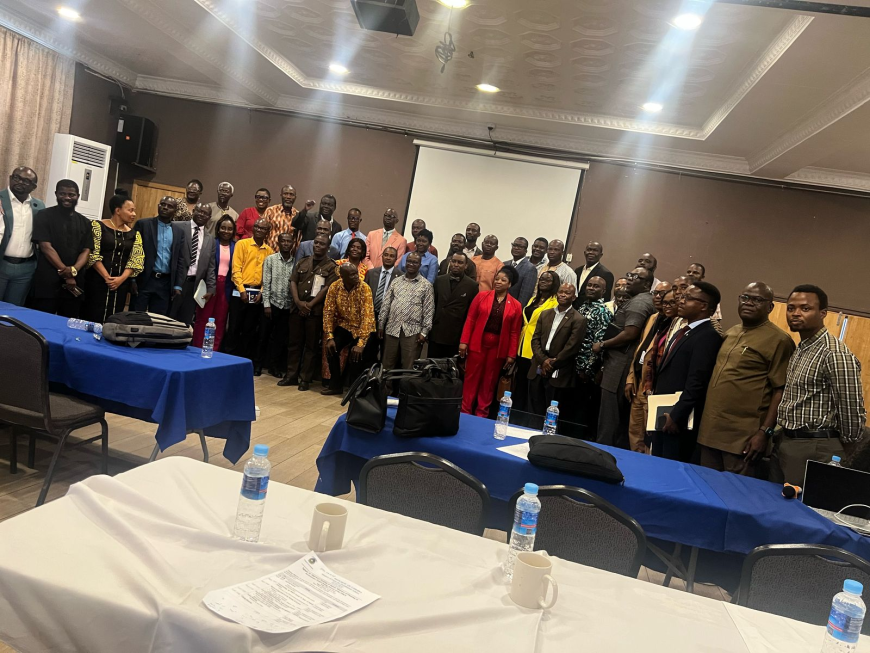Liberian Government Pushes for Results, Not Just Titles
Kwabo to Deputy Ministers: “Leadership Is About Impact, Not Position”

Monrovia Liberia:The Director General of the Cabinet, Nathaniel T. Kwabo, has called on government officials to focus on service delivery and accountability, not just holding titles. He made the statement on April 15 during a high-level session with Deputy Ministers and planners at the Bella Casa Hotel in Monrovia.
The session was part of the 2025 Performance Target-Setting Process under the Planning, Monitoring, and Compliance System (PMCS). Kwabo stressed that government institutions must align with President Boakai’s vision of a performance-driven government.
“This initiative is not about wearing titles on your skin,” Kwabo said. “It’s about delivering services to the Liberian people.”
The training focuses on helping ministries set clear, measurable targets tied to national goals. Over 90% of institutions reportedly met initial benchmarks in areas like human resources and financial systems.

Deputy Ministers and planners of Joseph Boakai's Government at the Bella Casa Hotel in Monrovia
During a high-level engagement session at the Bella Casa Hotel in Monrovia, Kwabo addressed Deputy Ministers for Planning and senior planning officers from various government ministries and agencies. The focus of the session was the ongoing 2025 Performance Target-Setting Process under the Planning, Monitoring, and Compliance System (PMCS)—a framework launched by the Office of the President to drive institutional efficiency and results.
“This initiative is not about wearing titles on your skin,” Kwabo emphasized. “It’s about delivering services to the Liberian people and being responsive to those who brought you to govern.”
Setting the Pace for Government Performance
Launched in 2024, the Performance Target-Setting Process is a key part of the presidential initiative aimed at improving service delivery and strengthening internal systems across government institutions. It requires each ministry and agency to develop and implement institutional Service Delivery Charters and align their performance targets with national development priorities.
According to Kwabo, more than 90% of government institutions successfully met the initial targets set during the first cycle of the initiative. These targets focused on critical areas such as human resource development and financial management control systems—two pillars that are essential for long-term institutional growth and efficiency.
The 2025 cycle of the PMCS is structured around three key phases:
Phase 1: Strategic Alignment (April 4–11)
This phase focused on reviewing institutional mandates and ensuring alignment with the national development agenda, specifically the ARREST Agenda for Inclusive Development (AAID). The Cabinet Secretariat, in collaboration with the Ministry of Finance and Development Planning (MFDP), conducted a comprehensive review of all government institutions.
Thirteen institutions were identified as having no prior interventions under the AAID. These institutions were provided with tools and technical guidance to help them identify the relevant policy pillars and develop sector-specific interventions. The outcomes of this phase will directly inform the target-setting activities of the next stages.
Phase 2: Target Development (April 14–25)
During this phase, Deputy Ministers and planning officers are tasked with developing SMART targets—Specific, Measurable, Achievable, Realistic, and Time-bound. These targets must be ambitious but grounded in reality, taking into account available resources and institutional capacity.
Key activities under this phase include:
• SMART Target Formulation: Crafting measurable goals with clear timeframes and impact indicators.
• Resource Planning: Identifying the human, financial, and technical resources required to meet targets.
• Implementation Strategizing: Developing action plans, outlining monitoring frameworks, and preparing risk mitigation strategies.
This stage empowers institutions to take ownership of their responsibilities and encourages leadership that is proactive and impact-driven.
Phase 3: Approval and Contracting (April 28–May 9)
In the final phase, developed targets will undergo a review and approval process. Upon approval, performance contracts will be signed between institutions and the Cabinet Secretariat, formalizing commitments and expectations for the year ahead.
These contracts are designed not only to hold institutions accountable but also to ensure that every target contributes to the broader national development objectives.
Support and Resources
To assist institutions throughout the process, the Cabinet Secretariat has made available a range of support resources, including training materials, planning tools, and expert guidance. Institutions are also encouraged to consult directly with the Secretariat and MFDP for technical advice and validation.
The session concluded with a presentation covering:
1. The 2025 Performance Target-Setting Process
2. Core Areas for Institutional Target Setting
3. Timeline and Key Activities
4. Support Resources Available to Institutions
Kwabo ended his remarks with a powerful message: “Leadership is not about having a title—it’s about delivering impact. This process is how we ensure that every official and every institution is doing just that.”
The performance target-setting initiative represents a significant step toward building a results-oriented culture in Liberia’s public service—one that prioritizes the needs of the people and fosters continuous improvement across all levels of government.
What's Your Reaction?










































































